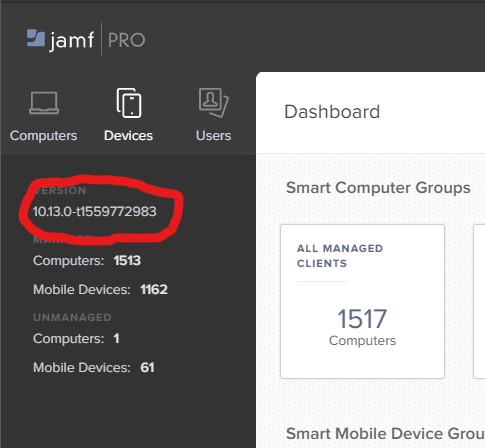Important guidelines for Unit Admins
Excessive CPU utilization on UF's hosted JAMF instance can lead to slowdowns in the JAMF console. In an attempt to keep the console more resposive, it's requested that unit admins adhere to the following guidelines regarding the creation of policies, smart groups, and configuration profiles.
Smart groups
Smart groups utilize a great deal of computer resources to maintain. The more criteria a smart group has, the larger the resource utilization. CPU utilization is compounded when a smart group's criteria consists of membership on other smart groups. Due to the high resource utilization of smart groups they should be used sparingly. To this end, smart groups should only be used as a target for scoping policies and configuration profiles. If the resulting machines are not being scoped to (for example, all that is needed is reporting), and advanced search should be used. The results of a saved advanced search will be updated each time an admin views it in the JAMF console.
How to create an advanced search
Details on how to create a new advanced search can be found in the Jamf Pro Administrator's Guide. At this time, there is no direct link from the JAMF console to the documentation for the appropriate version, so admins will need to verify the current version fron the JAMF console dashboard as illustrated below.

In this example, we will want to look at the documentation for version 10.13. The Jamf Pro Administrator's Guide has both an online and a PDF version. When viewing the online version, you can click on the magnifying glass in the upper right corner and enter in the search criteria 'advanced search' to bring up links to the various types of advanced search (computer, device, user).
Policies that force an inventory update
The process of forcing endpoints to submit update inventory info to JAMF and having JAMF process this info is another compute intensive process. This can be compounded when there are multiple ongoing policies all forcing an inventory update on each run. There is a global UFIT policy to perform an inventory update once per week (UF - Update Inventory). Units are asked to keep this in mind when deciding if an inventory update is required in their policies.
When should units include inventory update in a policy?
There are use cases where it does make sense to force endpoints to send updated inventory info. If a policy makes changes to endpoints that will affect their membership in a smart group (that is, it changes any criteria that a smart group depends on), then it would make sense to include a forced inventory update in in that policy so that the applicable smart groups get updated.
Re-enroll Deleted Devices
- On the device go to https://uf.jamfcloud.com/enroll.
- Enter the GL account and password of either a Site Admin, Basic Admin, or Enroll.
- Perform the steps for Automated Device Enrollment.
For more detailed information, reference this Jamf documentation, https://learn.jamf.com/en-US/bundle/jamf-now-documentation/page/Re-enrolling_a_Computer_Using_Automated_Device_Enrollment.html
